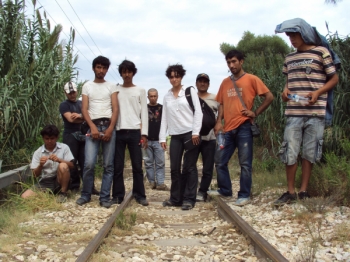As the French and British governments discuss how to deal with migrants camped outside Calais, Unreported World travels to the European Union's eastern border, to the illicit crossing points for hundreds of thousands of Afghans making their way to our shores.
Reporter Jenny Kleeman and director Jacob Waite begin their journey on Turkey's north-west coast, just eight miles from Greece and the EU. It's 2.40am and the team come across a people smuggler and 25 migrants - men, women, children and even toddlers, all from Afghanistan.
One of them tells Kleeman that he'd fled Afghanistan aged 13, after his father was taken away by the Taliban, and he'd worked in Iran for four years to earn $4000 to pay the smuggler. The fee covered a small inflatable dinghy, a little food and some basic life jackets. The team watches as all 25 get into the rickety craft and start paddling towards Greece. No one knows how many migrants try to make the eight-mile crossing, or how many drown. It's common for bodies to be found in the seas.
On the Greek island of Lesbos, which is popular with British tourists, the team meet another migrant, Massu, who's crossed over from Turkey the previous night. He's been walking across the island for eight hours with his wife, son and baby, on their way to the ferry terminal to try to get to Athens.
Thirteen thousand migrants are picked up by the Greek police on Lesbos every year. They are then held at the Pagani detention centre. It's very rare for journalists to be allowed in, but, after negotiations, the team gains access. The centre was built for 300, but often holds more than 1000 people. It's crowded, hot, dirty and smelly. The detainees claim they have no access to clean water, translators or doctors. Many say they feel unwell. In one cell for women and children there are two bathrooms to cater for around 100 people.
Kleeman recognises one of the migrants she'd seen setting off in the dinghy from Turkey. He tells her he was caught by the police and beaten up before being detained in the centre. Another detainee, Monir, tells her he used to work as a translator for the US army in Afghanistan. But, his family was threatened by the Taliban as a result, and they told him to leave the country.
Afghan migrants who are released from detention are given 30 days to leave Greece. Without a passport, they've got no way of doing it legally. Many move on to the Greek capital to consider their next move.
The team follows the migrants to Athens. In Attikis Square, a meeting point for Afghans, they hear allegations that police violence against migrants is common. Around the square, many are crammed into tiny flats, living in squalor. Kleeman visits one flat, home to 21 flea-bitten people, who share one bathroom. It's overrun with cockroaches.
Kleeman puts the migrants' allegations of ill treatment to the government minister responsible for their welfare. He tells her that he intervenes when he has reports of ill treatment. But, he says, at the same time, it's extremely difficult to cope because of the sheer numbers, and the EU as a whole needs to do more.
The team moves on to the port of Patras, from where ferries head off to the rest of Europe. Around the port, migrants are living in camps along railway tracks as they try every day to stow themselves away in lorries. The walls of the port are topped with razor wire, but it's full of bits of cloth torn from the clothes of the migrants who've been trying desperately to get inside.
It's clear that these desperate and determined people will stop at nothing for their chance to start a new life in Europe.
Watch the programme








 Join our page
Join our page


0 comments:
Post a Comment